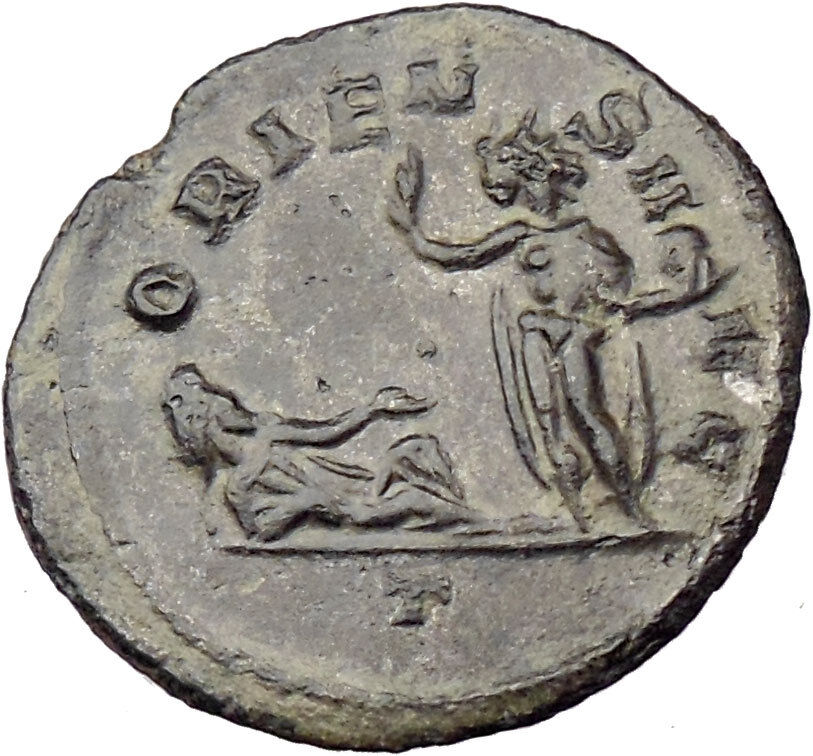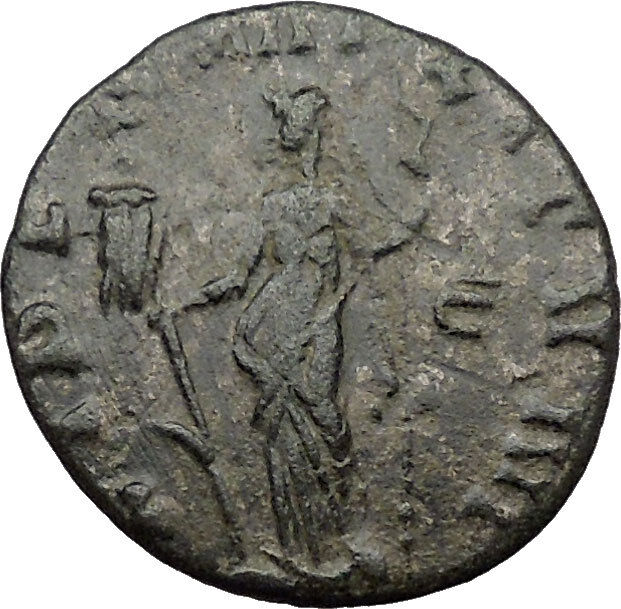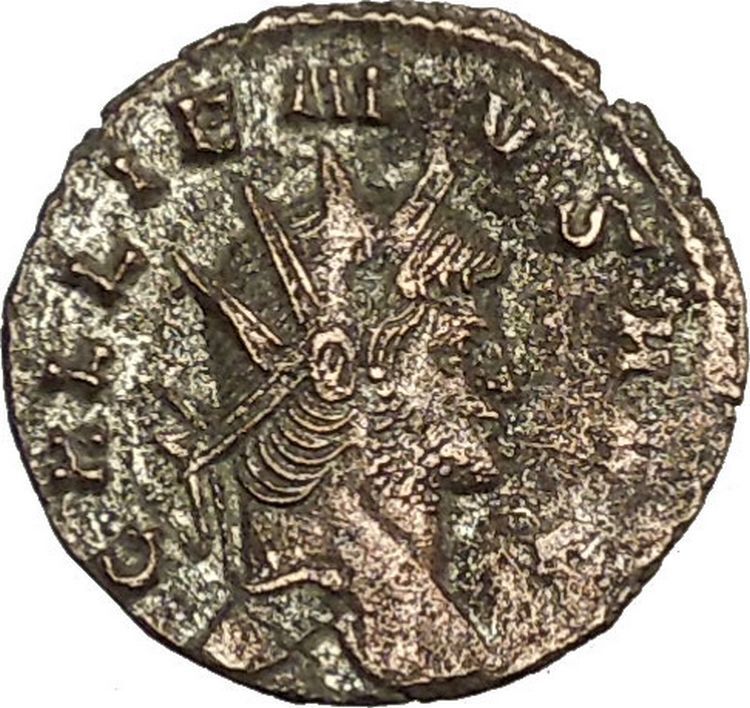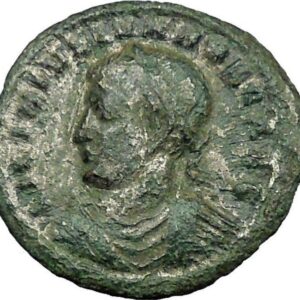|
Anonymous Issue, period of Roman Emperors Domitian to Antoninus Pius
Bronze Quadrans 14mm (2.80 grams) Rome mint, struck circa 81-161 A.D.
Reference: R. Weigel, “The Anonymous Quadrantes Reconsidered,” in Annotazioni Numismatiche Supplemento XI (1998), 18; RIC II 32; Cohen 36
Winged Petasos of Mercury left.
Winged caduceus of Mercury, S-C across fields.
The series of Imperial-era anonymous quadrantes portrays eleven deities: Jupiter, Minerva, Roma, Neptune, Tiber, Mars, Venus, Apollo, Mercury, Bacchus/Liber, and Hercules, as well as the Four Seasons. They invariably depict either a portrait on the obverse and an attribute of the deity on the reverse, or otherwise an attribute on either side. These designs appear to be influenced, but not directly copied from, earlier designs of the Republican period.
You are bidding on the exact item pictured, provided with a Certificate of Authenticity and Lifetime Guarantee of Authenticity.
 Mercury is a major Roman god, being one of the Dii Consentes within the ancient Roman pantheon. He is the patron god of financial gain, commerce, eloquence (and thus poetry), messages/communication (including divination), travelers, boundaries, luck, trickery and thieves; he is also the guide of souls to the underworld. He was considered the son of Maia and Jupiter in Roman mythology. His name is possibly related to the Latin word merx (“merchandise”; compare merchant, commerce, etc.), mercari (to trade), and merces (wages); another possible connection is the Proto-Indo-European root merĝ- for “boundary, border” (cf. Old English “mearc”, Old Norse “mark” and Latin “margō”) and Greek οὖρος (by analogy of Arctūrus/Ἀρκτοῦρος), as the “keeper of boundaries,” referring to his role as bridge between the upper and lower worlds.[citation needed] In his earliest forms, he appears to have been related to the Etruscan deity Turms, both of which share characteristics with the Greek god Hermes. In Virgil’s Aeneid, Mercury reminds Aeneas of his mission to found the city of Rome. In Ovid’s Fasti, Mercury is assigned to escort the nymph Larunda to the underworld. Mercury, however, fell in love with Larunda and made love to her on the way. Larunda thereby became mother to two children, referred to as the Lares, invisible household gods. Mercury is a major Roman god, being one of the Dii Consentes within the ancient Roman pantheon. He is the patron god of financial gain, commerce, eloquence (and thus poetry), messages/communication (including divination), travelers, boundaries, luck, trickery and thieves; he is also the guide of souls to the underworld. He was considered the son of Maia and Jupiter in Roman mythology. His name is possibly related to the Latin word merx (“merchandise”; compare merchant, commerce, etc.), mercari (to trade), and merces (wages); another possible connection is the Proto-Indo-European root merĝ- for “boundary, border” (cf. Old English “mearc”, Old Norse “mark” and Latin “margō”) and Greek οὖρος (by analogy of Arctūrus/Ἀρκτοῦρος), as the “keeper of boundaries,” referring to his role as bridge between the upper and lower worlds.[citation needed] In his earliest forms, he appears to have been related to the Etruscan deity Turms, both of which share characteristics with the Greek god Hermes. In Virgil’s Aeneid, Mercury reminds Aeneas of his mission to found the city of Rome. In Ovid’s Fasti, Mercury is assigned to escort the nymph Larunda to the underworld. Mercury, however, fell in love with Larunda and made love to her on the way. Larunda thereby became mother to two children, referred to as the Lares, invisible household gods.
Mercury has influenced the name of many things in a variety of scientific fields, such as the planet Mercury, and the element mercury. The word mercurial is commonly used to refer to something or someone erratic, volatile or unstable, derived from Mercury’s swift flights from place to place. He is often depicted holding the caduceus in his left hand.
|





 Mercury is a major Roman god, being one of the Dii Consentes within the ancient Roman pantheon. He is the patron god of financial gain, commerce, eloquence (and thus poetry), messages/communication (including divination), travelers, boundaries, luck, trickery and thieves; he is also the guide of souls to the underworld. He was considered the son of Maia and Jupiter in Roman mythology. His name is possibly related to the Latin word merx (“merchandise”; compare merchant, commerce, etc.), mercari (to trade), and merces (wages); another possible connection is the Proto-Indo-European root merĝ- for “boundary, border” (cf. Old English “mearc”, Old Norse “mark” and Latin “margō”) and Greek οὖρος (by analogy of Arctūrus/Ἀρκτοῦρος), as the “keeper of boundaries,” referring to his role as bridge between the upper and lower worlds.[citation needed] In his earliest forms, he appears to have been related to the Etruscan deity Turms, both of which share characteristics with the Greek god Hermes. In Virgil’s Aeneid, Mercury reminds Aeneas of his mission to found the city of Rome. In Ovid’s Fasti, Mercury is assigned to escort the nymph Larunda to the underworld. Mercury, however, fell in love with Larunda and made love to her on the way. Larunda thereby became mother to two children, referred to as the Lares, invisible household gods.
Mercury is a major Roman god, being one of the Dii Consentes within the ancient Roman pantheon. He is the patron god of financial gain, commerce, eloquence (and thus poetry), messages/communication (including divination), travelers, boundaries, luck, trickery and thieves; he is also the guide of souls to the underworld. He was considered the son of Maia and Jupiter in Roman mythology. His name is possibly related to the Latin word merx (“merchandise”; compare merchant, commerce, etc.), mercari (to trade), and merces (wages); another possible connection is the Proto-Indo-European root merĝ- for “boundary, border” (cf. Old English “mearc”, Old Norse “mark” and Latin “margō”) and Greek οὖρος (by analogy of Arctūrus/Ἀρκτοῦρος), as the “keeper of boundaries,” referring to his role as bridge between the upper and lower worlds.[citation needed] In his earliest forms, he appears to have been related to the Etruscan deity Turms, both of which share characteristics with the Greek god Hermes. In Virgil’s Aeneid, Mercury reminds Aeneas of his mission to found the city of Rome. In Ovid’s Fasti, Mercury is assigned to escort the nymph Larunda to the underworld. Mercury, however, fell in love with Larunda and made love to her on the way. Larunda thereby became mother to two children, referred to as the Lares, invisible household gods.




